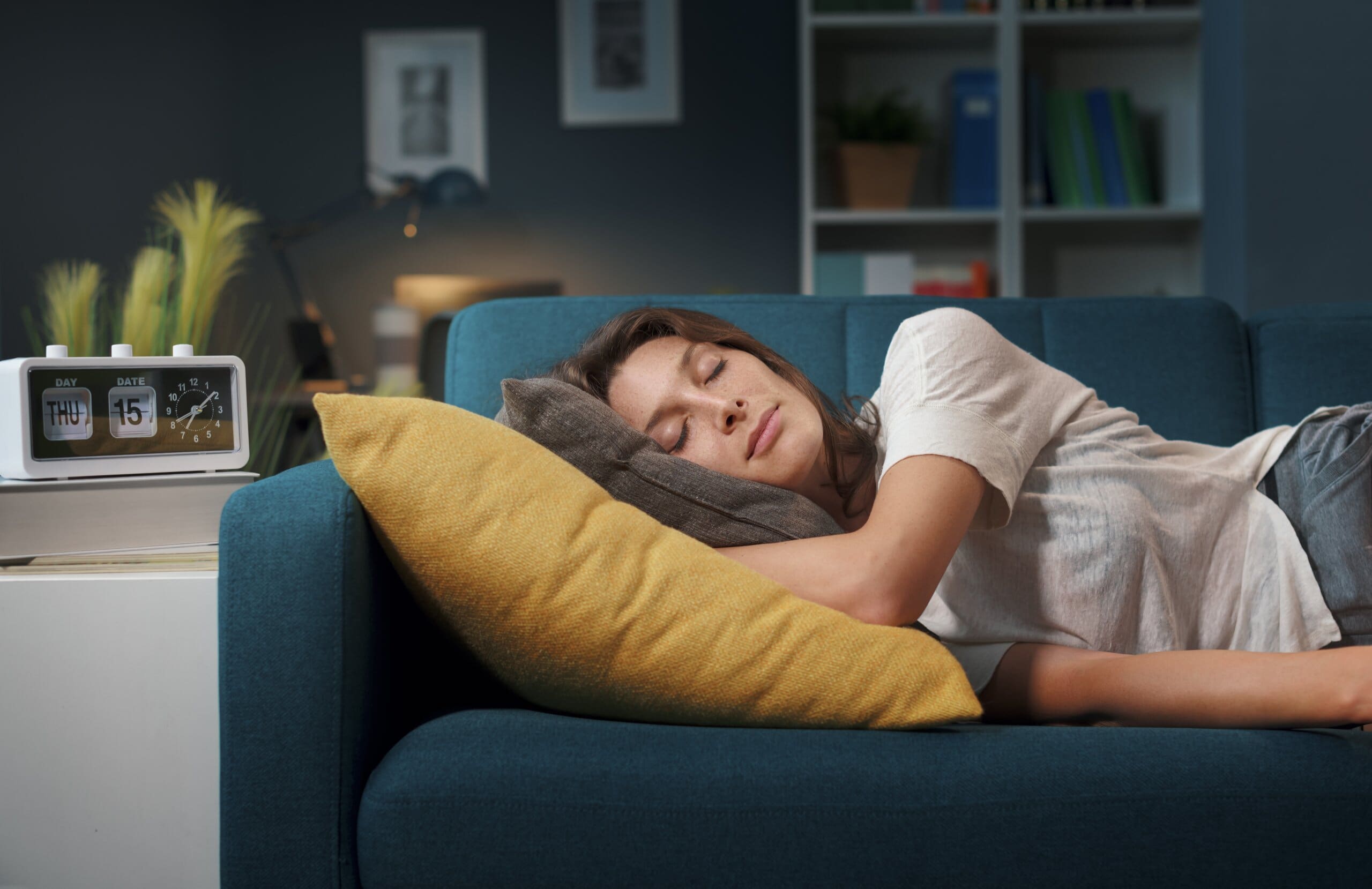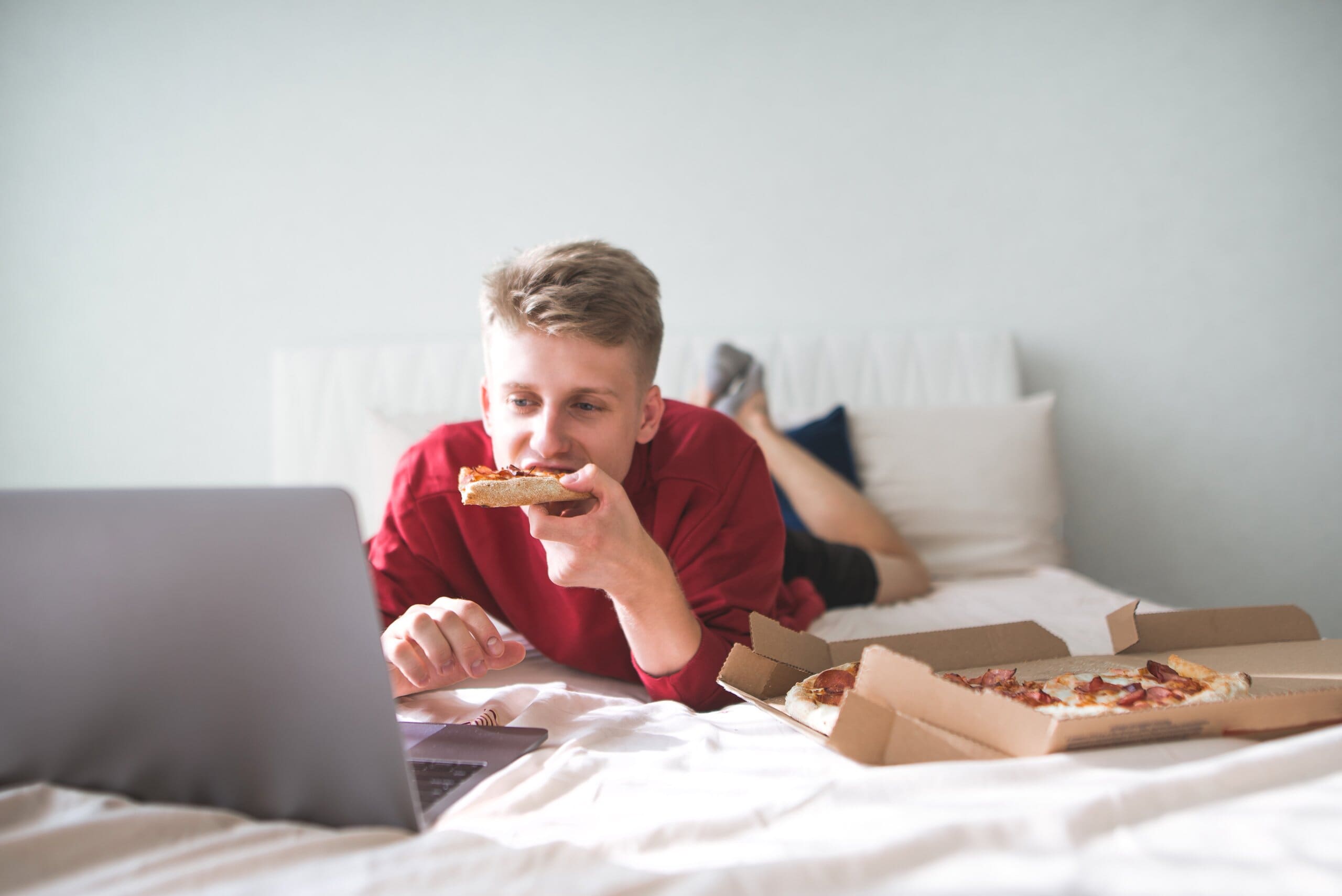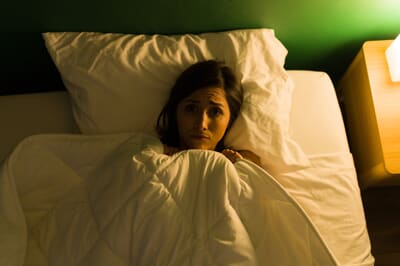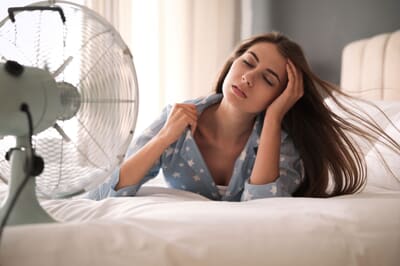When modern life runs at such a rapid pace, it’s easy to fall into the habit of eating and sleeping late, especially on those busy weekdays when you wind up working later than usual. Studies have shown it’s true that how soon we eat before bed can impact our sleep, but is it bad to sleep after eating?
It’s generally recommended to avoid large meals before going to bed as it can impact your digestion and disrupt your sleep. But if you’re feeling hungry, a small snack may help stabilise your cravings, level out your blood sugar levels and improve your quality of sleep.
Read on as we discuss the pros and cons, including how long you should wait to sleep after eating.

Does eating before bed affect sleep?
Yes, how much and how soon we eat before bed can impact the quality of our sleep. Experts advise against sleeping soon after eating a large meal as it takes several hours to properly digest our food, which can affect your ability to sleep. Meanwhile, eating too soon before bed can also impact your circadian rhythm – also known as your sleep-wake rhythm, or your internal body clock – and insulin sensitivity.
Your circadian rhythm plays a major part in how you digest and metabolise food, so it’s often better to eat larger meals earlier in the day than closer to bed.
However, some healthcare providers suggest that people with type 2 diabetes might benefit from a light snack in the evening to help maintain their blood sugar levels during the night. For dedicated advice, consult your doctor to help you make an informed decision based on your health needs.
How long should you wait to sleep after eating?
Nutritionists recommend that we wait at least three hours to sleep after eating, allowing enough time to properly digest our food. Following a consistent day and bedtime routine can help ensure you have enough time between eating and sleeping in the evening. For example, if you go to bed at 10:30pm each night, it’s a good idea to eat before 7:30pm.
However, depending on your lifestyle, finding a healthy balance by spacing out your meals and your bedtime can be challenging. For example, if you’re practising religious fasting and adjusting your sleep schedule during Ramadan.
Effects of sleeping after eating
We know how challenging it can be to fight the urge to snooze after a sizeable meal. Or how easy it is to fall into the habit of eating late when you have a busy schedule. But there are various reasons why experts say we should avoid sleeping after eating. Here are just a few potential side effects:
1. Bloating
If you haven’t fully digested your last meal before lying down to go to bed, you may find yourself feeling bloated. Bloating is where your stomach feels uncomfortably full or gassy, which can be caused by eating certain vegetables, fizzy drinks, and swallowing air as you eat. Bloating can also be triggered by going to bed too soon after eating, as it’s much harder for your body to digest food while lying in bed.
2. Acid reflux and heartburn
Sleeping too soon after eating can also cause symptoms of indigestion such as acid reflux, which is where stomach acid travels up to your throat and causes discomfort. Other symptoms also include heartburn – a burning sensation in your chest caused by acid reflux. If it keeps occurring, it can be called gastroesophageal reflux disease (GERD). So, if you already struggle with acid reflux, eating close to bedtime might exacerbate your symptoms.

3. Poor sleep
When we eat, our bodies produce insulin – a hormone that helps your body convert food into energy. If you eat too much before bed, the spike in insulin can impact the quality of your sleep. What’s more, eating right before bed can also impact your circadian rhythm and trigger your brain to stay alert rather than feeling ready to fall asleep.
Meanwhile, if you struggle with heartburn and acid reflux from indigestion, this might interrupt restful sleep too.
From improving memory and concentration to supporting healthy skin, there are many benefits to getting good sleep. So, it’s important to allow enough time between going to bed and large evening meals or opt for smaller nutritious meals in the evening.
4. Weight gain
While weight gain is not directly influenced by sleeping shortly after eating, research suggests that eating later can increase the chances of gaining weight. However, this can depend on the type of food and calories consumed.
Adults should eat a target number of calories every day, depending on their age and how much they exercise. If late-night meals tip the balance, this could lead to weight gain over time. However, there are many other factors that can contribute to weight gain and obesity, including health conditions, exercise, stress and genetics.
If you have insomnia and already struggle to fall or stay asleep at night, some of these side effects can make sleep even more challenging.
Should you go to bed hungry?
If you’re eating a healthy, balanced diet, it’s generally safe to go to bed a little hungry. But if feeling hungry will disturb your sleep, it’s often better to have a small, nutritious snack to help tide you over and let you rest. Having low blood sugar levels from being hungry can disrupt your sleep.
However, getting plenty of sleep each night can also help curb feelings of hunger by the time you go to bed – which may be caused by overtiredness.
If you’re feeling hungry due to cutting back calories for weight loss, or following intermittent fasting, make sure you’re getting the nutrients you need by maintaining a well-balanced diet and aren't falling into a disordered eating pattern.
Why do I get tired after I eat?
It’s normal to feel a little drowsy after eating, though the feeling can vary depending on the size and timing of your meal. This feeling of sleepiness after eating is known as postprandial somnolence. It’s most common during the afternoon – also known as the ‘post-lunch slump’.
There are various reasons why it happens, including:
- Eating can trigger a drop in hormones that can make you feel sleepier, including melatonin and serotonin.
- Your circadian rhythm naturally fluctuates throughout the day, which can often make you feel more tired in the afternoon after a meal.
- When you eat, the concentration of proteins known as cytokines rises, which has been linked to feeling tired.

What to eat before bed if you’re hungry
Experts recommend that we eat larger meals earlier in the day and smaller, nutritious meals later on. But if you’re really hungry before bed, it’s better to eat a light snack and allow some time between going to sleep.
Rather than eating fried and highly processed food, consider healthy proteins and fats in moderation. This can help satiate you for longer, so you can eat them earlier before bed and avoid becoming hungry or developing indigestion.
Here are a few healthy options if you need a late-night snack:
- Cherries
- Kiwi
- Banana
- Walnuts, almonds, pistachios and cashews
- Natural yoghurt
- Milk
- Oats
You should, however, avoid eating in bed, as you want to keep anything other than sleeping (or sex) out of the bedroom. This will help your mind associate your room with sleep and help you wind down more easily. Also, eating in bed can lead to unhealthy eating habits, so if you are hungry before bed, stick to a light snack in the kitchen.
Foods to avoid before sleeping
With this in mind, it’s important to be mindful of which foods could disrupt your sleep and digestion before going to bed. Experts recommend avoiding:
- Spicy food
- Acidic food, such as tomatoes and citrus
- Chocolate
- Fried food
- Caffeinated drinks
- Alcohol

Improve your sleep with MattressNextDay
Whether you’ve had a busy day or you’re in need of a healthier routine, it can be tricky to know how long you should wait to sleep after eating. As a rule of thumb, it’s best to give your body at least three hours to digest a main meal before going to bed. If you think you need a little snack, consider our tips above to help you manage meals in the evening and get better sleep.
Think your sleep routine could use a complete overhaul? Learn everything you need to know to improve your sleep, from everyday sleep health and habits, such as the best teas to drink before bed, to our expert mattress guides. You can also start browsing our mattress and bed frame range today and transform your bedroom tomorrow with free next-day delivery today.






